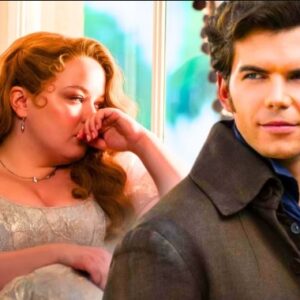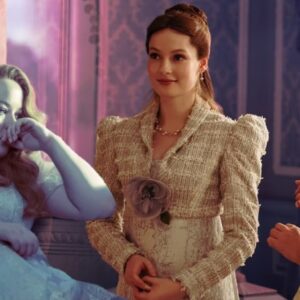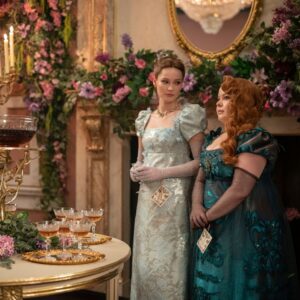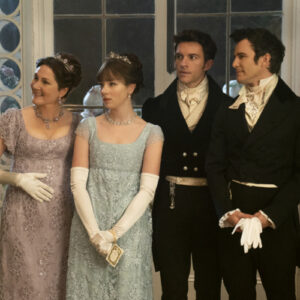Sarah Mulindwa is the host of Channel 4’s Sex Clinic and reveals the reasons sex and nudity on TV are so important
LOVED for his role as DI Steve Arnott in Line Of Duty, actor Martin Compston has left me perplexed this week by slating nude scenes on TV.
The 39-year-old star reckons today’s shows have too many “gratuitous” sex scenes.



He said: “People will tune in to see certain people naked — that’s just the way of the industry — and people have cottoned on to that.”
But in my role in The Sex Clinic, and as a senior sexual health nurse in the busiest clinic in Europe, I have to tell Martin this slight prudishness is a right turn-off.
There are so many reasons sex and nudity on TV are important.
For starters, let’s address the fact that almost a quarter of school pupils aged 14 to 18 are viewing porn — and these unrealistic sex scenes contribute towards skewed perceptions of everything from what naked bodies look like to how women like to have sex.
But creating space for sex scenes on TV and in films challenges these harmful misconceptions and paves the way to a healthier understanding of intimacy.
As a child of the Nineties, I grew up in East Dulwich, South London, with parents who migrated from Uganda in the Eighties, and culturally there was no way my dad was going to tell me about the birds and the bees.
If there was so much as a passionate kiss on our TV he’d wrestle with the remote until he had switched the channel over.
Generally, sex was not something parents spoke to their kids about openly back then, and there was about as much chance of my dad explaining the intricacies of sensual relations as there was of Sex And The City’s Samantha Jones getting through an episode without an orgasm.
And this is why sex on screen is a very welcome necessity — how else would we learn about it?
While concerns about explicit content are valid, there is a distinction between gratuitous depictions and those that contribute meaningfully to young people’s understanding.
Like many women my age, I learned about the power of a first kiss from the back of the cinema watching Romeo + Juliet.
As Romeo, played by Leonardo DiCaprio, and Juliet, played by Claire Danes, had a lingering snog under water, the first fountain of questions about intimacy bubbled up within me.
And the more nitty-gritty elements of adult relations were then informed by Sex And The City, which I first saw aged around 15.
SATC was a moment of enlightenment for me, my female pals and a whole generation of women.
The stars were often naked in the show, sure, but there was always context.
We learned that women could — shock horror — ask for what they want in the bedroom.
Sex ed is so below-par in British schools that many millennials went through the school system without having the foggiest about sex.
Samantha, played by Kim Cattrall, opened our eyes to a completely different world of intimate relations, rather than those poorly taught by a biology teacher.
Before our eyes she explored everything from fetishes to self-pleasure.
She did not subscribe to the idea that women should be “vanilla” and sexually hesitant that was so prevalent in the Nineties.


A lesson for all of burgeoning womanhood was when she explored self-pleasure by turning a neck massager into a vibrator.
Girls’ eyes, mine included, were opened to the fact that masturbation is not a guilty secret but a path to finding out what you like.
If Martin is right and the number of nudey roles is on the increase, then for education purposes I think that is no bad thing.
In my work I see youngsters in my local community learning about sex from TV, their friends or horrifyingly, from online porn.
It is much more preferable that young people are seeing sex and nudity via the controlled element of the gogglebox.
For example, the 2020 coming-of-age BBC series Normal People was the perfect introduction to young people of consent.
The story of Connell, played by Paul Mescal, falling in lust with Marianne, played by Daisy Edgar-Jones, was filled with full-frontal sex scenes, beautifully done.
Normal People showcased realistic sex, portraying characters as ordinary individuals rather than idealised fantasies.
Marianne loses her virginity to Connell in a wonderfully normal way that is so far from porn.
Her bra clasp gets stuck, they use a condom and giggle their way through the experience.
This shows that in real life, first-time sex is often imperfectly perfect without mind-boggling positions or instant moans of pleasure.
Consent is central, with Connell reminding Marianne before they get intimate: “If you want me to stop or anything, we can obviously stop.
“If it hurts or anything, we can stop. It won’t be awkward.”
This is the lesson to end all lessons when it comes to sex, the wisdom we crave to impart upon our children — consent is key.
Netflix series Sex Education is another victor in the category of great sex on screen.
As a sex educator, I can say hand on heart this is one of the best offerings when it comes to informing young people.
The show follows Otis, played by Asa Butterfield, as he reluctantly becomes his school’s resident sex educator thanks to decades of second-hand education from his sex therapist mum.
The show is educational in its approach to diverse sexual experiences and orientations. It provides young adults with a platform to again think about consent and how to communicate.
One of its great educational moments involves the character Isaac, a physically disabled young man, played by tetraplegic actor George Robinson, who uses a power-assisted manual wheelchair.
Isaac has a sexual experience with Maeve Wiley, played by Emma Mackey, in a scene that does away with what society expects of disabled people’s sexuality and is a seminal and very sexy moment.
But it’s not all serious lessons that are needed from sex on screen.
It’s so much fun to see romantic fantasies come to life — as they do in hit Netflix costume drama Bridgerton.
The show first aired in 2020, and ticks every fantasy box.
Ever dreamed a duke would come to whisk you away?
This is literally the storyline of the steamy drama’s first season.
The show follows Daphne Bridgerton, played by Phoebe Dynevor, the eldest daughter of the powerful Bridgerton family, as she makes her entrance into Regency London’s competitive marriage market and falls for handsome newcomer the Duke of Hastings, played by Rege-Jean Page.
Has your daydream ever taken you to a world where you have a naughty moment with a hot somebody, so passion-driven they take you on a staircase or in a library?
It happens, dreamily, in Bridgerton.
Like most sexy things on screen, Bridgerton takes you to a place of escapist fantasy that will do your mental wellbeing the world of good — and your libido too.
And it’s important to note that watching sexy scenes with your lover brings you closer together.
Studies from Michigan State University in 2020 found that watching sexually explicit programmes is associated with higher sexual satisfaction and openness with a partner.
Sexy fantasy dramas such as Fifty Shades Of Grey can be used as inspiration in your relationship.
The film portrays college student Anastasia Steele, played by Dakota Johnson, falling for businessman Christian Grey, played by Jamie Dornan, as they plunge into an affair laced with bondage.
Most of us have a pretty textbook sex life, and happily so, but a film in which sexual boundaries are crossed can open up conversations.
Maybe it will make you realise both of you like the idea of blindfolds.
It’s something you might never have known without seeing Mr Grey get down to business with Anastasia.
Risque screen moments serve a purpose beyond mere titillation — they contribute to a more authentic portrayal of human relationships, reflecting the intricacies of real-life connections.
Sorry, Martin, but you’re wrong. Save our TV nudes!
Additional reporting: Nikki Watkins







